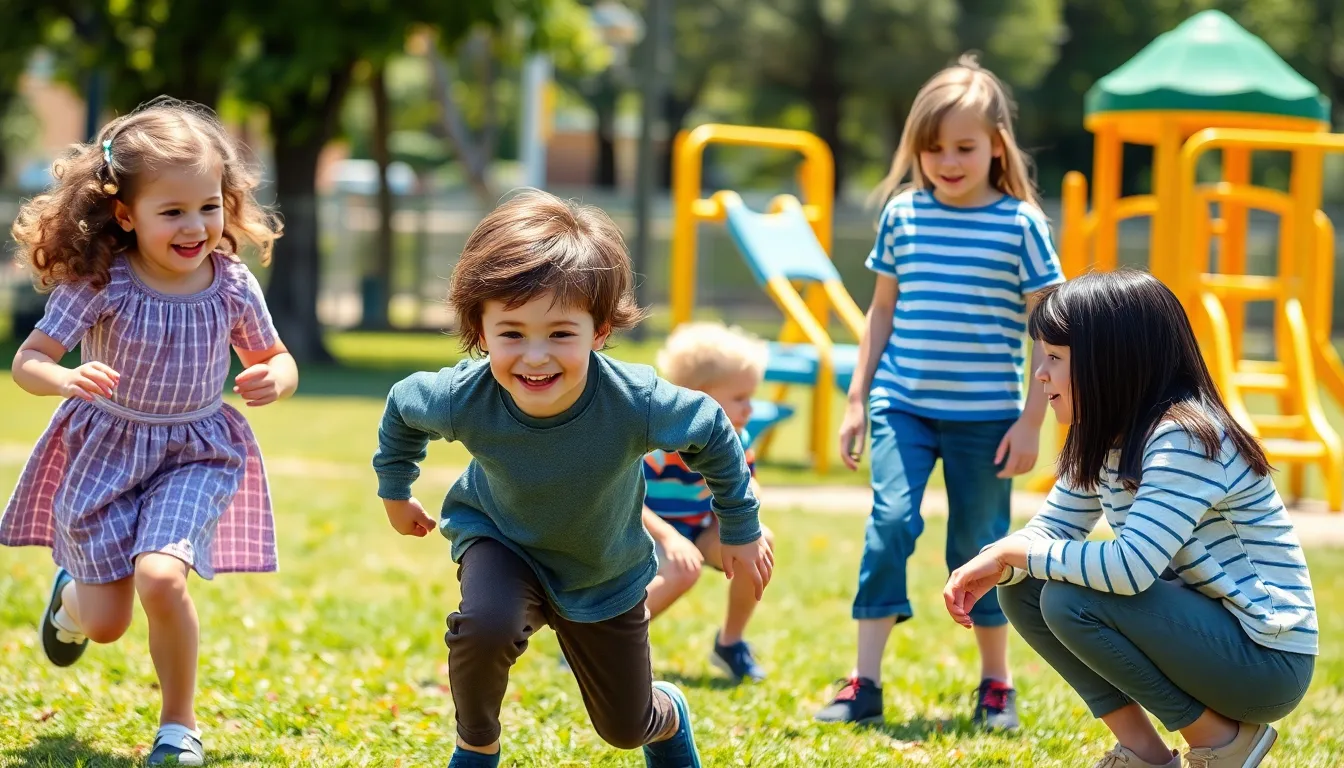Preschool games play a crucial role in early childhood development, blending fun with learning in ways that captivate young minds. These activities not only entertain but also foster essential skills like teamwork, problem-solving, and creativity. As children engage in playful interactions, they build social connections and enhance their cognitive abilities, setting a strong foundation for future learning.
In a world where screen time often dominates, incorporating interactive and imaginative games can spark joy and curiosity in preschoolers. From classic outdoor activities to innovative indoor games, the options are endless. Embracing these playful experiences allows children to explore their environment while developing key life skills, making preschool games an invaluable tool for parents and educators alike.
Table of Contents
ToggleOverview of Preschool Games
Preschool games play a crucial role in early childhood development, combining enjoyment and educational value to engage young learners. These activities cultivate various skills that benefit children’s growth in multiple domains.
Importance of Play in Early Development
Play serves as a foundational element in early development. Engaging in games allows children to develop critical thinking, social skills, and emotional intelligence. Children learn cooperation and negotiation through collaborative activities. Additionally, play promotes physical development by improving motor skills and coordination. Research indicates that unstructured playtime supports creative thinking and problem-solving capabilities, essential for lifelong learning.
Types of Preschool Games
Preschool games can be categorized into several types, each offering distinct benefits:
- Outdoor Games:
Include tag, hide-and-seek, and obstacle courses, fostering physical activity and teamwork.
- Board Games:
Encourage strategic thinking, counting, and turn-taking, enhancing cognitive and social skills.
- Imaginative Play:
Involves role-playing and storytelling, stimulating creativity and language development.
- Educational Games:
Focus on letters, numbers, and basic concepts, promoting early literacy and numeracy skills.
- Sensory Play:
Utilizes materials like sand, water, and playdough, enhancing fine motor skills and sensory exploration.
- Music and Movement Games:
Incorporate rhythm and dance, improving physical coordination and musical awareness.
Each type of game not only entertains but also supports critical developmental aspects, making them vital for preschool-aged children.
Benefits of Preschool Games


Preschool games yield significant benefits for young children’s growth. These activities promote cognitive abilities, enhancing social skills and laying a strong foundation for future learning.
Cognitive Development
Cognitive development flourishes through engaging preschool games. Games that involve problem-solving enhance critical thinking skills, as children learn to analyze situations and devise solutions. For example, puzzles challenge children to recognize patterns and shapes, boosting their spatial awareness. Additionally, educational games introduce concepts like counting, letters, and colors, reinforcing foundational knowledge needed for academic success. Interactive activities stimulate memory retention and boost attention spans, which are crucial for classroom environments.
Social Skills Enhancement
Social skills enhancement occurs naturally during preschool games. Activities that require teamwork teach children essential collaboration skills, as they learn to work towards a common goal. Games often encourage communication; children express their thoughts and ideas clearly, fostering active listening and respect for others’ opinions. Role-playing scenarios help develop empathy, as children take on different perspectives and understand emotions better. Shared play experiences cultivate friendships, providing opportunities for negotiation and conflict resolution, vital components of healthy social interactions.
Popular Preschool Games
Preschool games encompass a range of activities that bolster development in various areas. Outdoor and indoor games both provide unique experiences that foster physical, cognitive, and social growth.
Outdoor Games
Outdoor games engage children in active play while promoting physical health. Common outdoor preschool games include:
- Tag: Encourages running, agility, and social interaction as children chase one another.
- Hide and Seek: Develops spatial awareness and critical thinking as children strategize hiding spots.
- Simon Says: Enhances listening skills and promotes following instructions in a fun and dynamic environment.
- Duck, Duck, Goose: Fosters group interaction and adds elements of excitement through movement and anticipation.
These games not only improve motor skills but also nurture teamwork and cooperation as children play together.
Indoor Games
Indoor games provide stimulating alternatives when outdoor play isn’t feasible. Popular indoor preschool games feature:
- Board Games: Simple games like Candy Land and Chutes and Ladders teach turn-taking and basic counting.
- Sensory Play Stations: Activities using playdough, sand, or water support motor skills and sensory exploration.
- Role-Playing Games: Dress-up and imaginative scenarios promote creativity and social-emotional development as children navigate various roles and narratives.
- Musical Chairs: Combines music and movement, enhancing listening skills and physical coordination as children participate in playful elimination.
Through these games, children continue to develop valuable skills, maintaining engagement and interaction even indoors.
How to Choose the Right Preschool Games
Selecting appropriate preschool games involves understanding the child’s age and developmental stage while ensuring the activities promote skill development.
Consider Age Appropriateness
Ensuring age appropriateness significantly impacts engagement and learning. Games designed for specific age groups cater to their physical, cognitive, and social capacities. For instance, toddlers benefit from simple activities like stacking blocks or playing with soft balls, while preschoolers enjoy more complex games that involve rules and teamwork, like Simon Says or Memory. Classifying games by age helps parents and educators provide suitable challenges, encouraging growth without overwhelming children.
Focus on Skill Development
Focusing on skill development enhances the educational value of preschool games. Games should target essential skills like fine motor skills, communication, and critical thinking. Activities like puzzles build spatial awareness, while cooperative games foster teamwork and communication. Interactive games that require turn-taking and sharing reinforce social skills and emotional intelligence. Understanding the specific skills targeted by each game enables caregivers to select activities that align with children’s developmental needs, supporting holistic growth.
Preschool games play a crucial role in shaping a child’s early development. They not only provide entertainment but also serve as powerful educational tools that promote essential skills. By engaging in various activities, children enhance their cognitive abilities and social interactions in a fun and interactive manner.
Parents and educators can make informed choices by selecting age-appropriate games that align with developmental milestones. This approach ensures that children gain the maximum benefit from their playtime. Ultimately, integrating these games into daily routines helps create a balanced environment where children can thrive, explore, and grow into well-rounded individuals.




